2015届高三英语复习--特殊的反意疑问句课件
文档属性
| 名称 | 2015届高三英语复习--特殊的反意疑问句课件 | 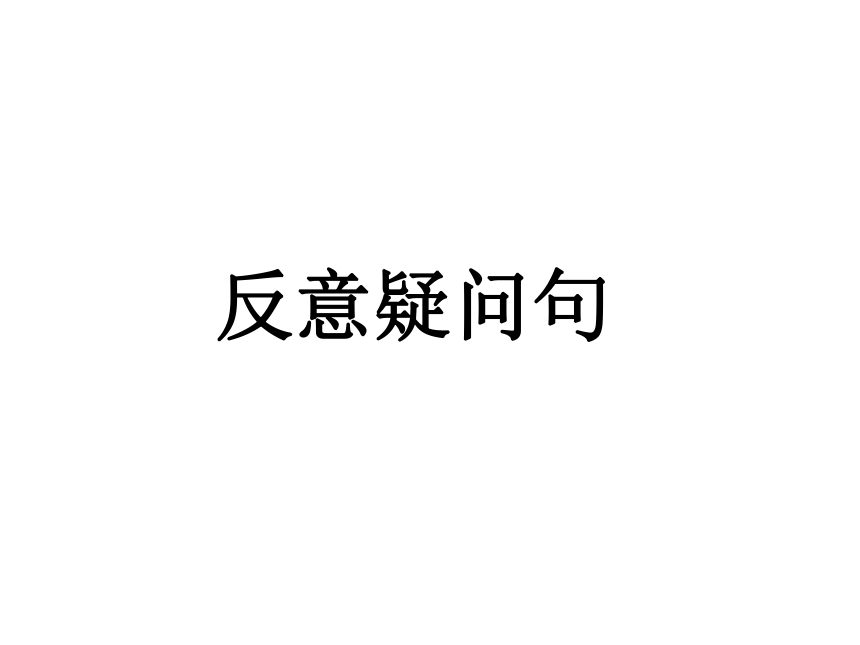 | |
| 格式 | zip | ||
| 文件大小 | 423.9KB | ||
| 资源类型 | 教案 | ||
| 版本资源 | 牛津译林版 | ||
| 科目 | 英语 | ||
| 更新时间 | 2014-08-12 11:06:58 | ||
图片预览

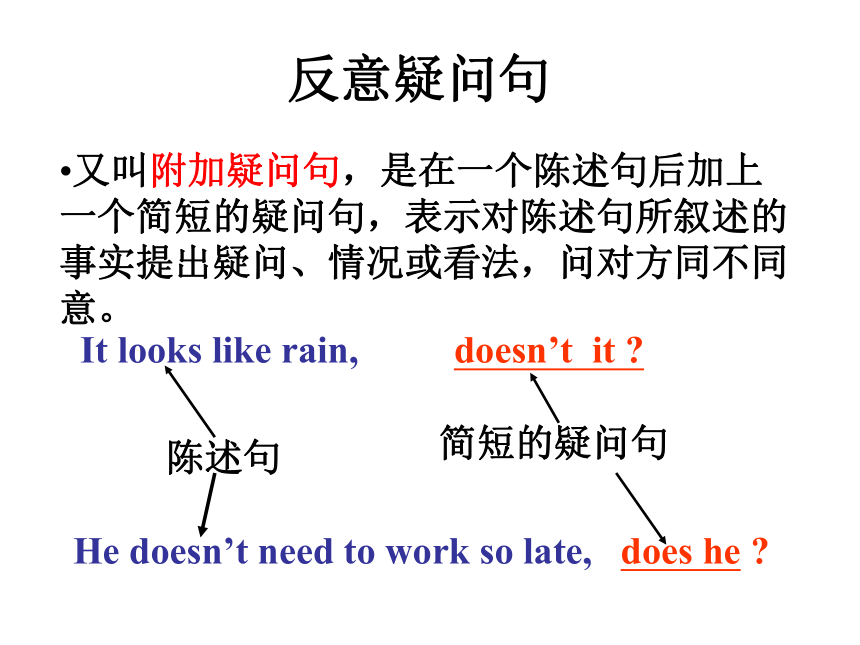
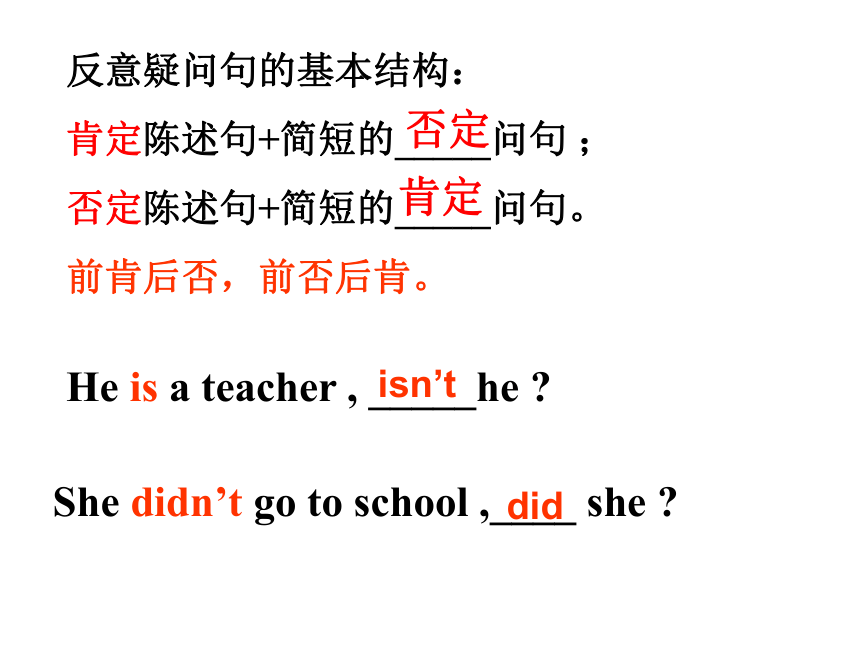
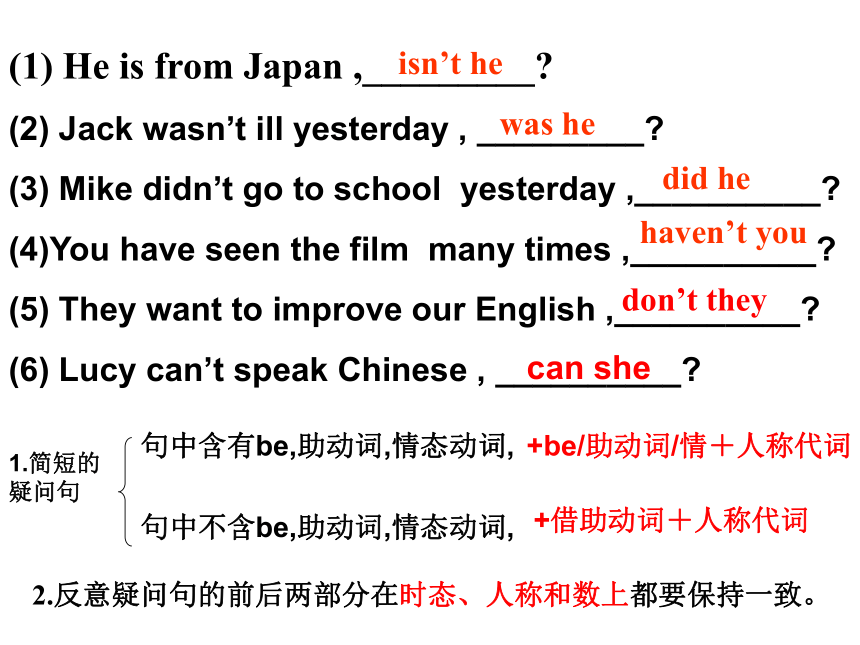
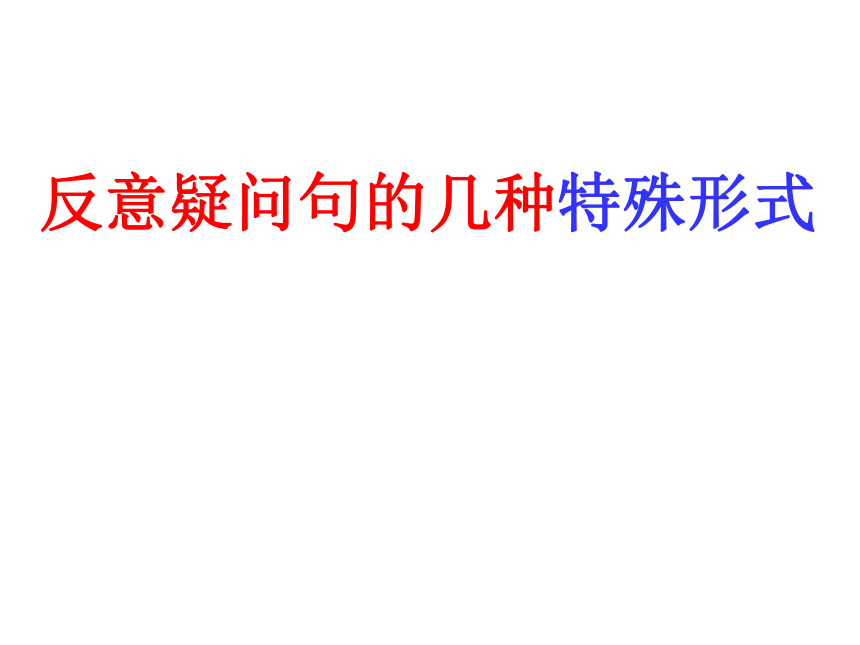
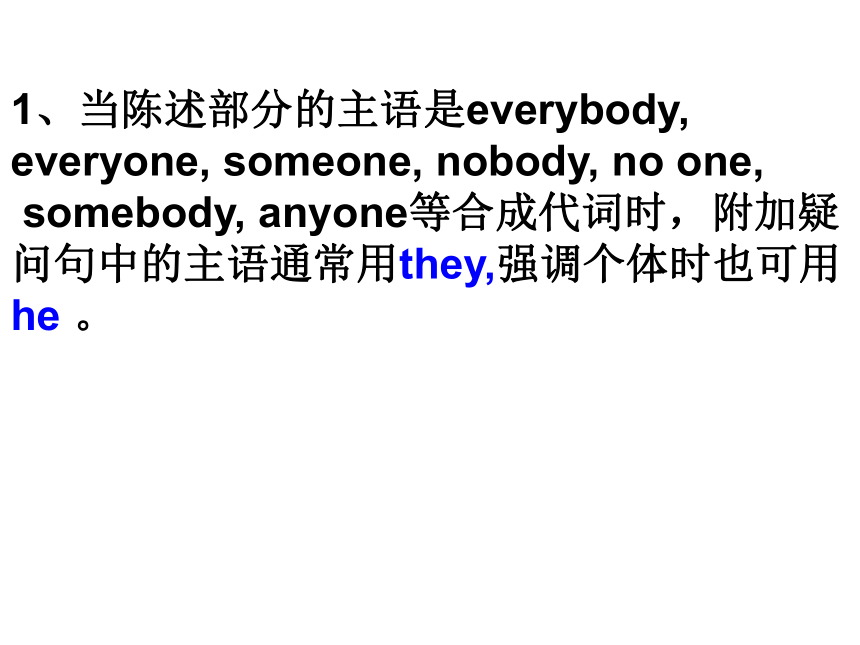
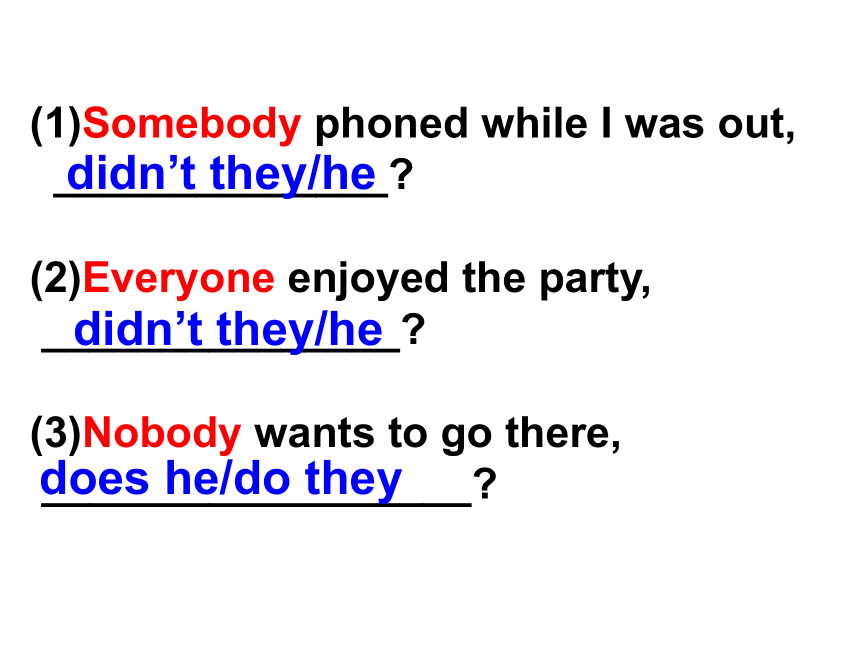

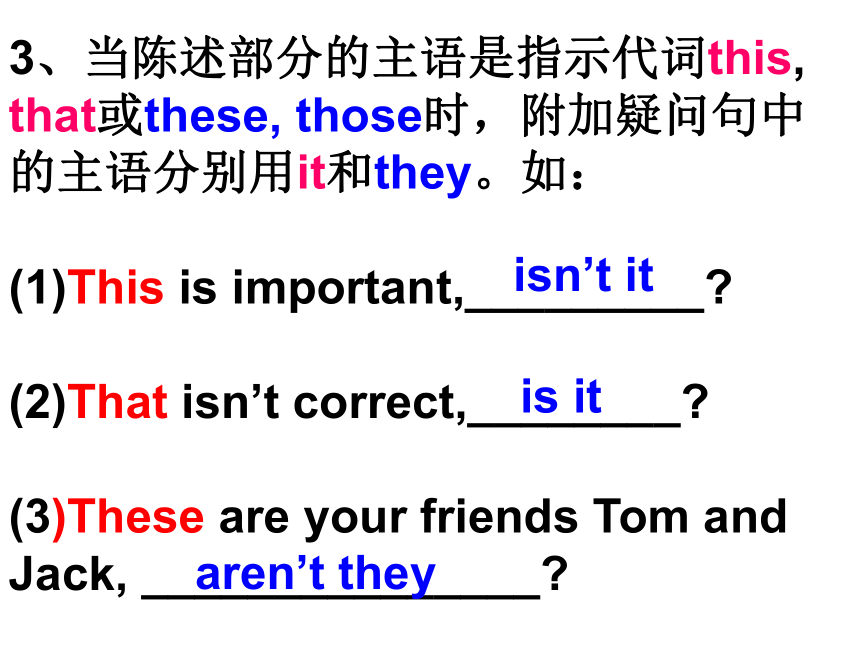
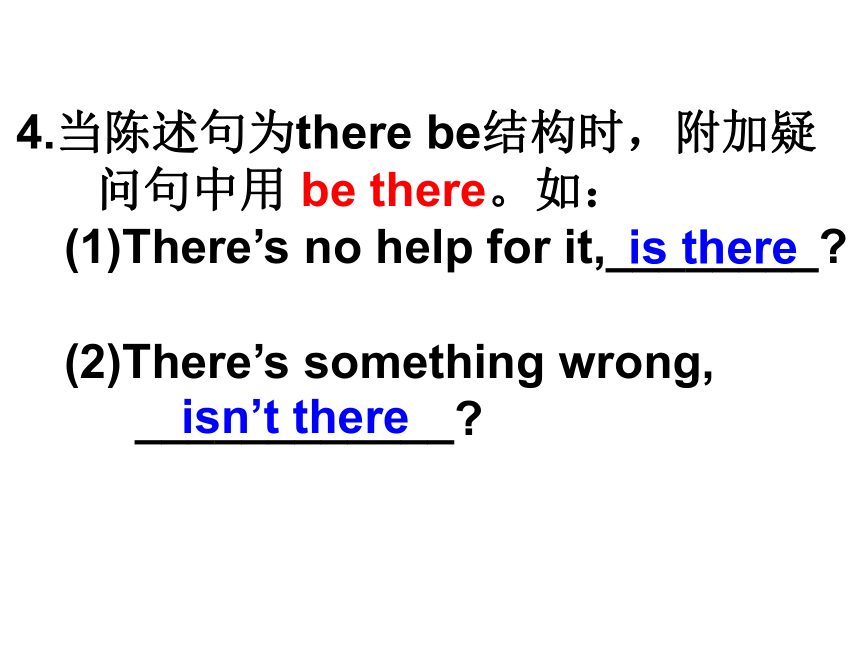
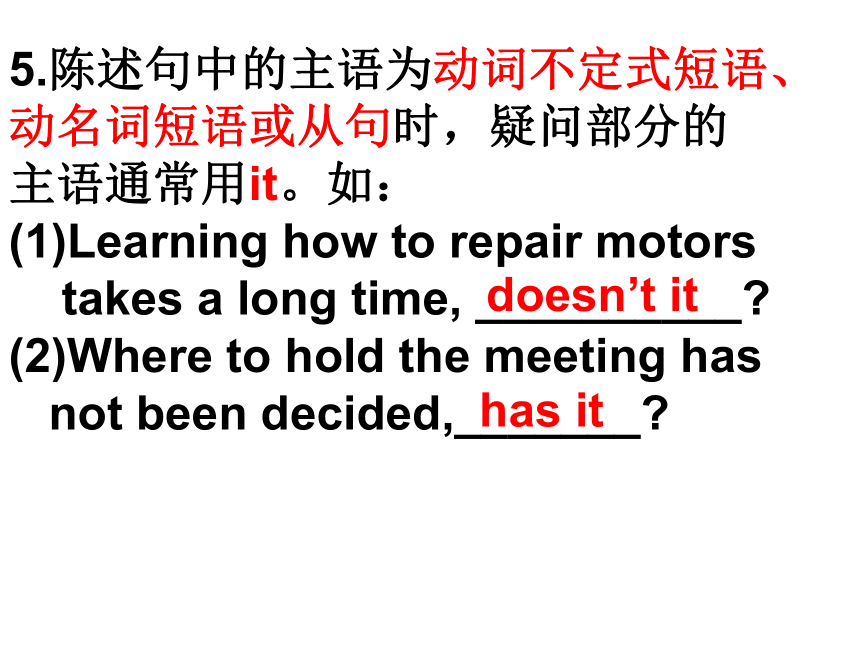
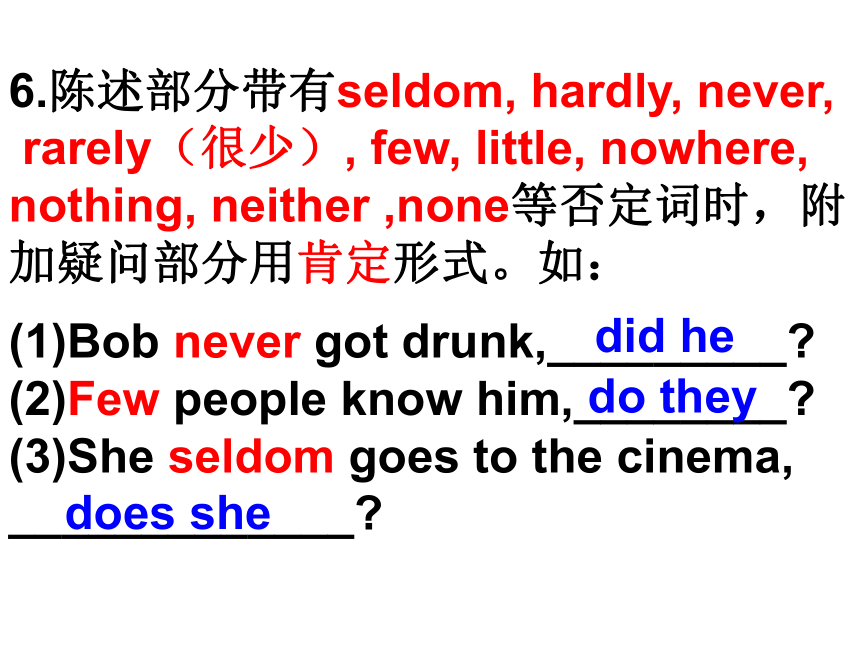
文档简介
课件35张PPT。反意疑问句反意疑问句又叫附加疑问句,是在一个陈述句后加上一个简短的疑问句,表示对陈述句所叙述的事实提出疑问、情况或看法,问对方同不同意。反意疑问句的基本结构:
肯定陈述句+简短的_____问句 ;
否定陈述句+简短的_____问句。
前肯后否,前否后肯。He is a teacher , _____he ?She didn’t go to school ,____ she ?否定didisn’t肯定2.反意疑问句的前后两部分在时态、人称和数上都要保持一致。(1) He is from Japan ,_________?
(2) Jack wasn’t ill yesterday , _________?
(3) Mike didn’t go to school yesterday ,__________?
(4)You have seen the film many times ,__________?
(5) They want to improve our English ,__________?
(6) Lucy can’t speak Chinese , __________?isn’t hewas hedid he haven’t youdon’t theycan she1.简短的
疑问句句中含有be,助动词,情态动词,句中不含be,助动词,情态动词,
+be/助动词/情+人称代词+借助动词+人称代词反意疑问句的几种特殊形式1、当陈述部分的主语是everybody,
everyone, someone, nobody, no one,
somebody, anyone等合成代词时,附加疑问句中的主语通常用they,强调个体时也可用he 。(1)Somebody phoned while I was out,
______________?
(2)Everyone enjoyed the party,
_______________?
(3)Nobody wants to go there,
__________________?didn’t they/hedidn’t they/hedoes he/do they2.当陈述部分的主语是不定代词
everything, nothing, anything,
something时,附加 疑问句中的主语
一般用it。 (1)Everything seems all right now,
___________?
(2)Nothing is kept in good order,
_____? doesn’t itis it3、当陈述部分的主语是指示代词this,
that或these, those时,附加疑问句中
的主语分别用it和they。如:
(1)This is important,_________?
(2)That isn’t correct,________?
(3)These are your friends Tom and Jack, _______________? isn’t itis itaren’t they4.当陈述句为there be结构时,附加疑
问句中用 be there。如:
(1)There’s no help for it,________?
(2)There’s something wrong,
____________?is thereisn’t there5.陈述句中的主语为动词不定式短语、
动名词短语或从句时,疑问部分的
主语通常用it。如:
(1)Learning how to repair motors
takes a long time, __________?
(2)Where to hold the meeting has
not been decided,_______? doesn’t ithas it6.陈述部分带有seldom, hardly, never,
rarely(很少), few, little, nowhere,
nothing, neither ,none等否定词时,附
加疑问部分用肯定形式。如: (1)Bob never got drunk,_________?
(2)Few people know him,________?
(3)She seldom goes to the cinema,
_____________? did hedo theydoes she注意:如果陈述部分含有否定前缀或否定
后缀的词,疑问部分用否定形式,如: (1)He was unsuccessful,_________?
(2)Tom dislikes the book,_________? wasn’t hedoesn’t he7.如果陈述部分用I’m…结构,附加疑
问部分一般用aren’t I。如:
I am strong and healthy ,______?
aren’t I但I was wrong again, wasn’t I?8.当陈述部分为主从复合句时,附加疑问部分一般应与主句的主语和谓语动词保持对应关系。 (1)She says that I did it,___________?
(2)I told them not everybody could
do it , _________? doesn’t shedidn’t I但当主句是I / we think / believe /
suppose/ expect时,附加疑问部分则
往往与从句中的主语和谓语动词保持对
应关系,但要注意否定的转移。(1) I suppose that he’s serious,
________?
(2)I don’t think she cares,________?
(3)We believe they will come,______?isn’t hedoes she won’t they(1)Let us go out for a rest,________?
(2)Let’s clean the classroom,
_________?
(3) Let’s not do that ,_________?will youshall we9 .以let’s开头的祈使句,疑问句部分用shall we,以let us开头的祈使句,疑问句部分用will you.all right
shall we10.陈述部分为否定的祈使句,疑问部分用will
you,陈述部分为肯定祈使句,疑问部分用will /
won’t you.
(1)Don’t open the door,_________?
(2) Give me some water for drinking,
______________?
will youwill /won’t you11.当陈述部分含有used to时,
疑问部分可用 usedn’t 或didn’t。 (1)The old man used to smoke,
___________________?
(2)Tom used to live here,
______________________?
(3)There used to be a tree there,
____________________? didn’t he / usedn’t heusedn’t he / didn’t heusedn’t/didn’t there12.当陈述部分带有情态动词ought to时,
疑问部分用oughtn’t或shouldn’t (1) He ought to know the answer,
____________________? oughtn’t /shouldn’t he(2)We ought to go there, ___________?shouldn’t we13.陈述部分有had better,疑问部分用had,陈述部分有would rather,would like时,疑问部分用would. 要注意区别简略形式。
(1)You’d better go now, __________?
(2)You’d rather go there early, ____________?
(3) He’d like to go, _____________?hadn’t youwouldn’t youwouldn’t he14.当陈述部分带有情态动词must
A: 表示“必须”时,疑问部分用mustn’t
/needn’t.(1)You must work hard next term,
_______________________?
(2) You must go home right now, ____________________________?mustn’t you / needn’t youneedn’t you/ mustn’t youB: mustn’t 表“禁止”,疑问部分用must。
e.g. You mustn’t walk on grass, _________?
C: must 表推测时,疑问部分不用must,而要根据需要改写。如:
e.g. He must be very tired, ________?
(=I’m sure he is very tired.)must youisn’t heHe must have waited for a long time, _________?
(=I’m sure he has waited for a long time.)
You must have seen the play last week, __________?
(=I’m sure you saw the play last week.)
He must have done it ,______________hasn’t hedidn’t youdidn’t he/hasn’t he?
*陈述部分的动词是must be,
且表示目前情况的猜测时,附加疑问句
部分的动词要用be的人称变化形式。(1) He must be very tired, ________?
(=I’m sure he is very tired.)
(2)They must be teachers,________?aren’t they isn’t he 表推测这层含义时,反意问句不能用must陈述部分的谓语是“must+ have done”, 表示对过去情况的猜测,有明确的时间状语时,附加疑问句中的动词部分需用did; 无明确的过去时间状语或有与现在相关的时间状语时,疑问部分用have/ has 。
15.陈述句中的谓语动词是wish,
表示愿望时用may,且用肯定形式。
I wish to have a chance to learn
English,_______? may I16.感叹句后的附加疑问句的谓语动词
需用be的现在时,且常用否定形式。
What a clever boy,_________?
What a lovely day,_________?16.感叹句后的附加疑问句的谓语动词需用be 的现在时,且常用否定形式。
(1) What a lovely day ,________?
(2) What a clever boy,________?
(3)Good weather,___________?isn’t heisn’t itisn’t it17.当陈述部分有实意动词have/ has(表“有”)
时,疑问部分既可用have形式,也可
用do形式。如:
(1)You have a new bike,
_______________________?
(2)He had a lot of hobbies,____________?
haven’t /don’t you)haven’t/didn’t he
注意:陈述句部分的 have
不表示“有”时,附加疑问
句中的动词部分需用do形式。
(1)Mark had a meeting last week, _________?(2)She had her computer repaired
yesterday,____________?
(3)You had a Chinese class just now,
__________?didn’t shedidn’t youdidn’t heShe didn’t go to school ,did she ? 她没去上学,是吧?不!她去了Yes, she did.是的!她没去No, she didn’t He is a teacher , isn’t he ?他是个老师,不是吗?Yes, he is. No, he isn’t反意疑问句的 回答:事实上是肯定的就用Yes,事实上是否定的,就用No,不能出现前面用yes 后用not 或前面用No后面用肯定的现象。Don’t do that again, will you?1._____________, I will never do it .Sorry, I do B. No, I do
C. Yes, I won’t D. sorry, I won’t2.She is going to play basketball ,isn’t she ?___________, She will take lessons .Yes, she isn’t B. No, she is
C. Yes, she is D. No, she isn’t3.We believe she can do it better, can’t she?__________,she is doing her best to improve herself .Yes, we do B. Yes , she can
C. Yes, we don’t D. Yes, she doesn’t DDB
Practice Ⅰ
You come here, _________________?
Let us start with the song, ___________?
I’m late, __________?
You'd better go there now, __________?
Everything is ready, ___________?
He is unkind to his classmates, _________?
Some plants never bloom, _________? will you / won’t youwill youhadn’t you isn’t it isn’t hearen’t I do they1. ---Why does she always ask you for help?
---There is no one else she can turn to, ________?
A. is there B. is it
C. can she D. does she
APractice Ⅱ 3. Don’t have the light burning, _____?
A. have you B. do you
C. will you D. shall weC2. Nothing that can be done is important, _____? A. can’t they B. isn’t it
C. can it D. is itD4. All of us seldom went to the cinema at that time, ______? A. didn’t they B. did we
C. didn’t we D. did allB5. Li Feng’s unhappy at the news, ______? A. isn’t he B. hasn’t he
C. does he D. is heA
肯定陈述句+简短的_____问句 ;
否定陈述句+简短的_____问句。
前肯后否,前否后肯。He is a teacher , _____he ?She didn’t go to school ,____ she ?否定didisn’t肯定2.反意疑问句的前后两部分在时态、人称和数上都要保持一致。(1) He is from Japan ,_________?
(2) Jack wasn’t ill yesterday , _________?
(3) Mike didn’t go to school yesterday ,__________?
(4)You have seen the film many times ,__________?
(5) They want to improve our English ,__________?
(6) Lucy can’t speak Chinese , __________?isn’t hewas hedid he haven’t youdon’t theycan she1.简短的
疑问句句中含有be,助动词,情态动词,句中不含be,助动词,情态动词,
+be/助动词/情+人称代词+借助动词+人称代词反意疑问句的几种特殊形式1、当陈述部分的主语是everybody,
everyone, someone, nobody, no one,
somebody, anyone等合成代词时,附加疑问句中的主语通常用they,强调个体时也可用he 。(1)Somebody phoned while I was out,
______________?
(2)Everyone enjoyed the party,
_______________?
(3)Nobody wants to go there,
__________________?didn’t they/hedidn’t they/hedoes he/do they2.当陈述部分的主语是不定代词
everything, nothing, anything,
something时,附加 疑问句中的主语
一般用it。 (1)Everything seems all right now,
___________?
(2)Nothing is kept in good order,
_____? doesn’t itis it3、当陈述部分的主语是指示代词this,
that或these, those时,附加疑问句中
的主语分别用it和they。如:
(1)This is important,_________?
(2)That isn’t correct,________?
(3)These are your friends Tom and Jack, _______________? isn’t itis itaren’t they4.当陈述句为there be结构时,附加疑
问句中用 be there。如:
(1)There’s no help for it,________?
(2)There’s something wrong,
____________?is thereisn’t there5.陈述句中的主语为动词不定式短语、
动名词短语或从句时,疑问部分的
主语通常用it。如:
(1)Learning how to repair motors
takes a long time, __________?
(2)Where to hold the meeting has
not been decided,_______? doesn’t ithas it6.陈述部分带有seldom, hardly, never,
rarely(很少), few, little, nowhere,
nothing, neither ,none等否定词时,附
加疑问部分用肯定形式。如: (1)Bob never got drunk,_________?
(2)Few people know him,________?
(3)She seldom goes to the cinema,
_____________? did hedo theydoes she注意:如果陈述部分含有否定前缀或否定
后缀的词,疑问部分用否定形式,如: (1)He was unsuccessful,_________?
(2)Tom dislikes the book,_________? wasn’t hedoesn’t he7.如果陈述部分用I’m…结构,附加疑
问部分一般用aren’t I。如:
I am strong and healthy ,______?
aren’t I但I was wrong again, wasn’t I?8.当陈述部分为主从复合句时,附加疑问部分一般应与主句的主语和谓语动词保持对应关系。 (1)She says that I did it,___________?
(2)I told them not everybody could
do it , _________? doesn’t shedidn’t I但当主句是I / we think / believe /
suppose/ expect时,附加疑问部分则
往往与从句中的主语和谓语动词保持对
应关系,但要注意否定的转移。(1) I suppose that he’s serious,
________?
(2)I don’t think she cares,________?
(3)We believe they will come,______?isn’t hedoes she won’t they(1)Let us go out for a rest,________?
(2)Let’s clean the classroom,
_________?
(3) Let’s not do that ,_________?will youshall we9 .以let’s开头的祈使句,疑问句部分用shall we,以let us开头的祈使句,疑问句部分用will you.all right
shall we10.陈述部分为否定的祈使句,疑问部分用will
you,陈述部分为肯定祈使句,疑问部分用will /
won’t you.
(1)Don’t open the door,_________?
(2) Give me some water for drinking,
______________?
will youwill /won’t you11.当陈述部分含有used to时,
疑问部分可用 usedn’t 或didn’t。 (1)The old man used to smoke,
___________________?
(2)Tom used to live here,
______________________?
(3)There used to be a tree there,
____________________? didn’t he / usedn’t heusedn’t he / didn’t heusedn’t/didn’t there12.当陈述部分带有情态动词ought to时,
疑问部分用oughtn’t或shouldn’t (1) He ought to know the answer,
____________________? oughtn’t /shouldn’t he(2)We ought to go there, ___________?shouldn’t we13.陈述部分有had better,疑问部分用had,陈述部分有would rather,would like时,疑问部分用would. 要注意区别简略形式。
(1)You’d better go now, __________?
(2)You’d rather go there early, ____________?
(3) He’d like to go, _____________?hadn’t youwouldn’t youwouldn’t he14.当陈述部分带有情态动词must
A: 表示“必须”时,疑问部分用mustn’t
/needn’t.(1)You must work hard next term,
_______________________?
(2) You must go home right now, ____________________________?mustn’t you / needn’t youneedn’t you/ mustn’t youB: mustn’t 表“禁止”,疑问部分用must。
e.g. You mustn’t walk on grass, _________?
C: must 表推测时,疑问部分不用must,而要根据需要改写。如:
e.g. He must be very tired, ________?
(=I’m sure he is very tired.)must youisn’t heHe must have waited for a long time, _________?
(=I’m sure he has waited for a long time.)
You must have seen the play last week, __________?
(=I’m sure you saw the play last week.)
He must have done it ,______________hasn’t hedidn’t youdidn’t he/hasn’t he?
*陈述部分的动词是must be,
且表示目前情况的猜测时,附加疑问句
部分的动词要用be的人称变化形式。(1) He must be very tired, ________?
(=I’m sure he is very tired.)
(2)They must be teachers,________?aren’t they isn’t he 表推测这层含义时,反意问句不能用must陈述部分的谓语是“must+ have done”, 表示对过去情况的猜测,有明确的时间状语时,附加疑问句中的动词部分需用did; 无明确的过去时间状语或有与现在相关的时间状语时,疑问部分用have/ has 。
15.陈述句中的谓语动词是wish,
表示愿望时用may,且用肯定形式。
I wish to have a chance to learn
English,_______? may I16.感叹句后的附加疑问句的谓语动词
需用be的现在时,且常用否定形式。
What a clever boy,_________?
What a lovely day,_________?16.感叹句后的附加疑问句的谓语动词需用be 的现在时,且常用否定形式。
(1) What a lovely day ,________?
(2) What a clever boy,________?
(3)Good weather,___________?isn’t heisn’t itisn’t it17.当陈述部分有实意动词have/ has(表“有”)
时,疑问部分既可用have形式,也可
用do形式。如:
(1)You have a new bike,
_______________________?
(2)He had a lot of hobbies,____________?
haven’t /don’t you)haven’t/didn’t he
注意:陈述句部分的 have
不表示“有”时,附加疑问
句中的动词部分需用do形式。
(1)Mark had a meeting last week, _________?(2)She had her computer repaired
yesterday,____________?
(3)You had a Chinese class just now,
__________?didn’t shedidn’t youdidn’t heShe didn’t go to school ,did she ? 她没去上学,是吧?不!她去了Yes, she did.是的!她没去No, she didn’t He is a teacher , isn’t he ?他是个老师,不是吗?Yes, he is. No, he isn’t反意疑问句的 回答:事实上是肯定的就用Yes,事实上是否定的,就用No,不能出现前面用yes 后用not 或前面用No后面用肯定的现象。Don’t do that again, will you?1._____________, I will never do it .Sorry, I do B. No, I do
C. Yes, I won’t D. sorry, I won’t2.She is going to play basketball ,isn’t she ?___________, She will take lessons .Yes, she isn’t B. No, she is
C. Yes, she is D. No, she isn’t3.We believe she can do it better, can’t she?__________,she is doing her best to improve herself .Yes, we do B. Yes , she can
C. Yes, we don’t D. Yes, she doesn’t DDB
Practice Ⅰ
You come here, _________________?
Let us start with the song, ___________?
I’m late, __________?
You'd better go there now, __________?
Everything is ready, ___________?
He is unkind to his classmates, _________?
Some plants never bloom, _________? will you / won’t youwill youhadn’t you isn’t it isn’t hearen’t I do they1. ---Why does she always ask you for help?
---There is no one else she can turn to, ________?
A. is there B. is it
C. can she D. does she
APractice Ⅱ 3. Don’t have the light burning, _____?
A. have you B. do you
C. will you D. shall weC2. Nothing that can be done is important, _____? A. can’t they B. isn’t it
C. can it D. is itD4. All of us seldom went to the cinema at that time, ______? A. didn’t they B. did we
C. didn’t we D. did allB5. Li Feng’s unhappy at the news, ______? A. isn’t he B. hasn’t he
C. does he D. is heA
